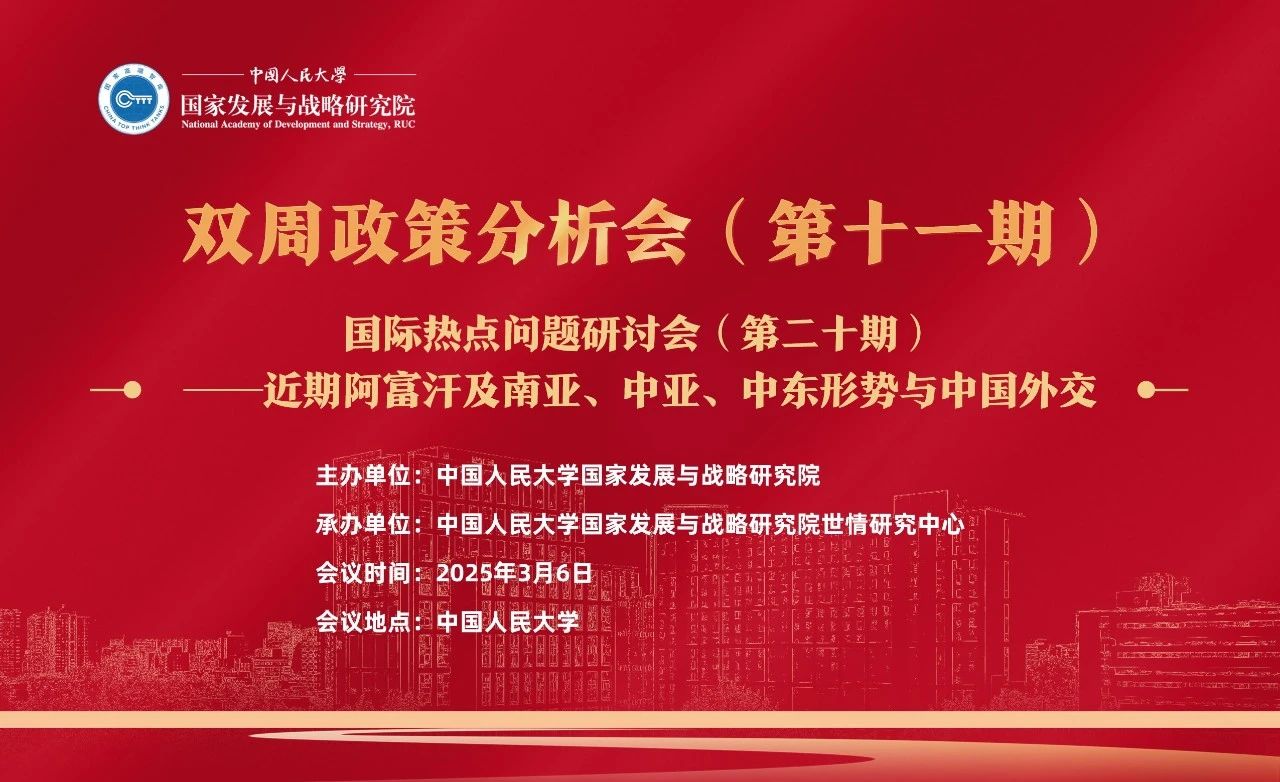 Research Update
Research Update
20
Mar
On March 6, 2025, the 11th Biweekly Policy Analysis Meeting and the 20th International Hotspot Issues Seminar — “The Recent Situation in Afghanistan, South Asia, Central Asia, the Middle East, and China’s Diplomacy” — was successfully held. The event was hosted by the National Academy of Development and Strategy at Renmin University of China and organized by the Center for Global Affairs Studies.
Distinguished experts and scholars attending the seminar included: Yue Xiaoyong, Special Envoy for Afghan Affairs of the Ministry of Foreign Affairs of the People’s Republic of China; Niu Xinchun, Vice President of the Chinese Association of Middle East Studies, Academic Vice President and Professor at Ningxia University; Hu Shisheng, Director and Senior Research Fellow of the Institute of South Asian Studies at the China Institutes of Contemporary International Relations; Li Li, Deputy Director and Senior Research Fellow of the Institute of International Studies at Tsinghua University; Zhu Yongbiao, Dean and Professor at the School of Politics and International Relations at Lanzhou University; and Diao Daming, Professor and Director of the Department of Diplomacy at the School of International Studies at Renmin University of China. The seminar was chaired by Zhu Dan, Research Fellow at the National Academy of Development and Strategy and Deputy Director of the Center for Global Affairs Studies at Renmin University of China.
Yue Xiaoyong, Special Envoy for Afghan Affairs of the Ministry of Foreign Affairs of the People’s Republic of China, introduced recent efforts by China, in collaboration with Afghanistan’s neighboring countries, relevant regional states, and the international community, to respond to the evolving situation in Afghanistan. He emphasized that China’s policy on the Afghan issue reflects the country’s approach of fostering good-neighborly relations and common development, as well as its sincere commitment and concrete actions to work together with other countries to promote the building of a community with a shared future for humanity and for its surrounding regions.
Experts at the seminar, drawing on progress in their respective research fields, the latest outcomes of international exchanges, and the current situation in Afghanistan and its surrounding regions in South Asia, Central Asia, and the Middle East — as well as the development of China’s foreign relations — engaged in in-depth exchanges and multi-perspective analyses on major power dynamics and shifts in regional and international policies.
All experts agreed that China has played a highly active role in addressing regional hotspot issues and stands as a major power with one of the strongest records in safeguarding and promoting world peace, stability, security, and common development. China’s persistent exploration of solutions with Chinese characteristics to address international hotspot challenges and its constructive role in both longstanding and emerging regional issues demonstrate the vitality and guiding significance of the Global Security Initiative, the Global Development Initiative, and the Global Civilization Initiative advocated by Chinese leadership.
(Translated by ZHANG Yuqing; Proofread by YANG Fanxin)